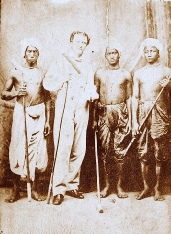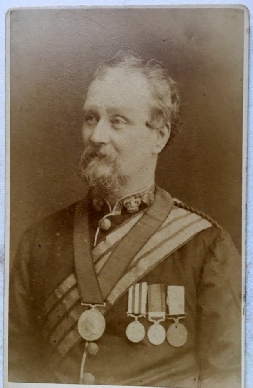Friends of Hastings Cemetery

Hastings and St Leonards Observer -
DEATH OF MAJOR-
We deeply regret to announce the death of Major-
His loss will be mourned by a large circle of friends in public and private life. His affability and kindliness made him one of the most popular of our townsmen, and his knowledge of military matters was of great service to the Conservative party on those occasions when, as Ruling Councillor of the local Habitation of the Primrose League, he presided over their public meetings. Still more frequently was the General’s name before the public as organiser and supporter of various charitable and philanthropic efforts.
Major-
He was born on board the Providence on April 12th, when the ship was going through a terrible hurricane. He was educated at Hampton, Middlesex, and subsequently in Jersey under a private tutor. He entered the East India Company's Military College at Addiscombe as a cadet in January, and received his commission as Ensign in the Indian Army on December 10th, 1847, coming third on the rolls out of 23 infantry cadets then examined.
On the 7th March 1848 he landed in India, and August. he was posted to the 49th Regiment Bengal Native Infantry…
He was promoted Lieutenant I January. 1851. In May. 1840, he had passed the "Lower Standard" colloquial examination, and in August, 1853. also passed the "Higher Standard" Hindustani, qualifying for staff employ. In January, I854, he was appointed by the Commander-
……The young officer received the highest commendations at the end of the Mutiny. In 1858 was appointed second in command of the Light infantry. The loyalty of the native regiment which Lieutenant Sherer was attached to was conspicuously shown in the Mutiny, ant this was very largely due to his popularity and personal influence.
…………………
For his services during the terrible cholera epidemic at Shilling in 1870 Colonel Sherer received warm acknowledgment from the local Government. He retired from the service on a Colonel's pension and extra annuity, with the brevet rank of Major-
Any account of Major- goblet and salver. Through his instrumentality the game became widely known.
goblet and salver. Through his instrumentality the game became widely known.
[Modern polo originated in Manipur, a northeastern state of India. The Silchar Polo Club was founded in 1859 by British military officers and tea planters, after Lieutenant Joe Sherer saw the locals playing polo and said, “We must learn the game!” From India, polo spread as fast as its enthusiasts could travel, appearing in Malta in 1868, England in 1869, Ireland in 1870, Argentina in 1872 and Australia in 1874.
https://lapolo.in/blog/joseph-
Major-
A staunch Conservative in politics, the General was made Ruling Councillor of the local Habitation of the Primrose League, and held this position to his death, though latterly ill health had prevented him from presiding at Ward meetings of the League.
He was Churchwarden attending at St. Matthew's, Silverhill. In this connection especially, with the R.S.P.C.A., and the "Soldiers' and Sailors' Families Association, Major -
THE FUNERAL. YESTERDAY. The funeral took place yesterday (Friday), at the Borough Cemetery. The first part of the service was conducted at St. Paul's Church, where there was a large congregation. ..........The singing was most impressive. There was a considerable crowd outside the church...... As the coffin was carried from the church the Nunc Dimittis" was beautifully chanted to Gregorian tones, and when it reached the gate the choir formed up on either side, the bell solemnly tolling meanwhile................. The coffin—which was covered with the Union Jack, and which was the work of Mr. A. C. Towner, of Norman-
Maj.Gen. Sherer ‘rescued’ George Monger V.C. When he was apprised of the Monger family’s desperate situation. He immediately set out to help them. He also publicised their situation and raised funds from royalty, the regiment, J. C. Kenwood and the local people. (An account, presumably written by Maj.Gen. Sherer, can be read in David Thornton’s Hastings, A Living History.p 327-
